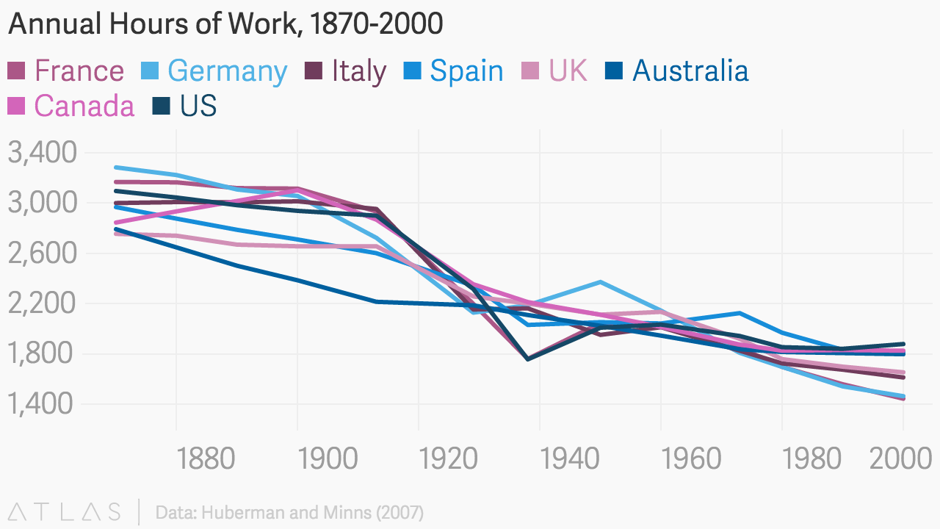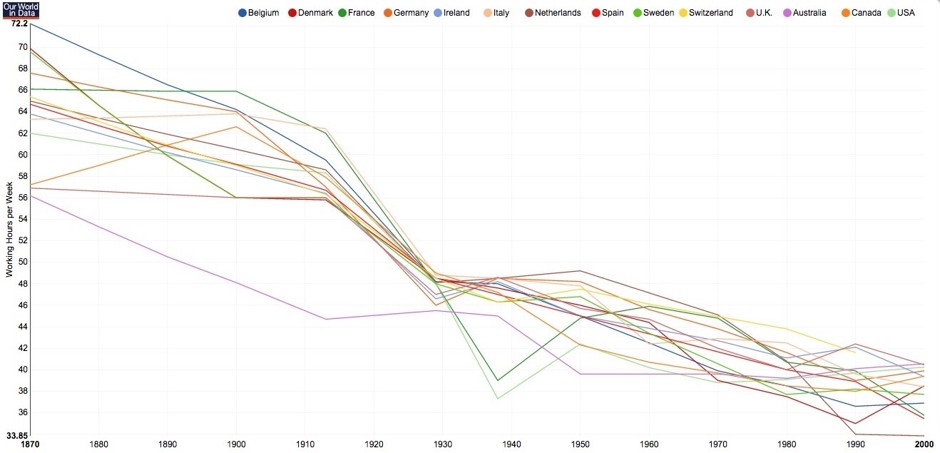
pcruciatti / Shutterstock.com
Stop Complaining About Your 'Long' Work Week, in 2 Charts
People toiled for many more hours in the Industrial Age than they do in the digital one.
The Transportationist blog points us to data showing the long decline ofannual work hours among developed Western nations. CityLab charted a handful of the labor-hour trajectories below. The trends are remarkably consistent across countries: people have been working less and less since the Industrial Revolution, with total hours falling from around 3000 a year toward the 1500-1800 range:

CityLab
Naturally, this data also means that people are working fewer hours each week. Max Roser charts the weekly trends for 14 countries. Again, across the board, hours fell from the 65 to 70 range toward the 40-hour work week we know so well today. Sure puts those Tuesday blues in perspective. (Visit the original chart to turn the plot lines for various nations off or on.)

The natural assumption here is that if we could extend the year axis to the left, back toward Medieval times, we’d see work hours rise even more. But that’s not necessary true. In her book The Overworked American: The Unexpected Decline of Leisure, sociologist Juliet Schor writes that people “did not work very long hours at all” in the pre-capitalist era. Here’s Schor:
The tempo of life was slow, even leisurely; the pace of work relaxed. Our ancestors may not have been rich, but they had an abundance of leisure. When capitalism raised their incomes, it also took away their time. Indeed, there is good reason to believe that working hours in the mid-nineteenth century constitute the most prodigious work effort in the entire history of humankind.
Of course, working more hours leads to getting more done, but that relationship isn’t an endless straight line. Evidence shows that as work hours increase beyond a certain point, productivity can decrease. Recent research tracking the non-linear link between hours and output sets the tipping point at about 50 hours a week. As the Economist points out in its write up, that means working 70 hours isn’t much better than putting in 56.
Every now and then calls emerge to chop the workweek down even further—to 30-some hours or maybe 4 days a week. (Although, as my Atlantic colleague Joe Pinsker reports, the idea is largely a fantasy of select labor set: “well-educated, highly-paid workers who manipulate symbols all day—not the nation’s workers as a collective whole.”) But even if you’re stuck working 40 or 50 hours for the near future, you can be thankful you’re not living in the recent past.
(Top image via pcruciatti / Shutterstock.com )






